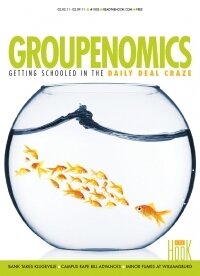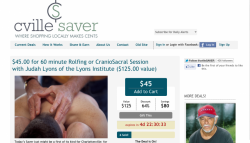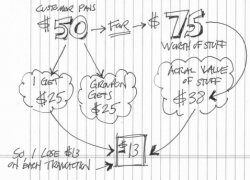Groupenomics II: Companies still profiting from deal craze
-
 Jerry Miller launched deal site CatchMyFire, but he contends that daily deals are only one social marketing tool businesses should use.Dave McNair
Jerry Miller launched deal site CatchMyFire, but he contends that daily deals are only one social marketing tool businesses should use.Dave McNair -
 Last year, the Hook wrote about the 'daily deal' craze. But has the phenomenon cooled?hook cover
Last year, the Hook wrote about the 'daily deal' craze. But has the phenomenon cooled?hook cover -
 "This business is like a roller coaster," says Travis Wilburn, owner of CvilleSaver.web capture
"This business is like a roller coaster," says Travis Wilburn, owner of CvilleSaver.web capture -
 The owner of a bike shop in Brooklyn, New York created this illustration to show how Groupon worked for him.718 Cyclery
The owner of a bike shop in Brooklyn, New York created this illustration to show how Groupon worked for him.718 Cyclery
About this time last year, the buzz surrounding the group buying craze was frenetic: Half-off food at your favorite restaurant! Up to 75 percent off a spa visit!
For some businesses struggling through a recession, it may have seemed like manna from heaven. In Charlottesville, Groupon and Living Social deals began producing pre-paid customers, and soon the phenomenon gave birth to copycat local ventures like CvilleSaver, CatchMyFire, and the Hook's own Daily Deal.
The buzz was bound to cool as customers experienced "deal fatigue" and businesses tired of taking losses as a form of so-called advertising (as the deal sites take up to 50 percent of a deal's revenue). Yet, a year later, the business model is still a going concern.
The biggest player, Groupon, went public in November after just three years in business, raising $700 million, the most by a US Internet company since Google's eye-popping $1.7 billion IPO in 2004. And just recently, Forbes reported that Groupon co-founder Eric Lefkofsky's net worth has reached $2.9 billion.
But what about the local players? Are they still making a go of it?
"I think the deal offers will fizzle out over time," says restaurant group manager Stu Rifkin, who (with The Nook) was the first to offer a local Groupon deal. At the time, Rifkin, no fan of traditional advertising, says he felt bullish about the notion of driving customers through the door. But what a difference a year makes.
"Based on the offers I see," says Rifkin, "they are already on the back side of their effectiveness."
Riflkin, however, asserts that deals can still provide value for certain businesses, particularly new ones, and that they can be especially helpful during slow times.
On the afternoon of March 8, for instance, the queue eager eaters at Zazus Fresh Grille on Ivy Road includes a couple of Living Social voucher-waving patrons, and the cashier volunteers that business has been jumping since a deal, which sold 822 units, went live on March 2.
"Isn't this your thing?" asks one customer, holding his voucher marked "LivingSocial," of a Hook staffer.
Nope, not ours; but Zazus was actually the first business to jump aboard the Hook's Daily Deal last year. And while the platform enjoyed some early success– including moving 348 discounted rides to New York City aboard the Starlight Express– the site has languished as the paper's owners have dealt with "other priorities," according a company spokesperson.
For Jerry Miller, president of Virginia Media Ventures, their deal site CatchMyFire is just another tool, like a Facebook page, a website with a blog feature, or digital presentations, that allows businesses to leverage the power of social media.
Ultimately, Miller sees the daily deal as a small piece of a larger puzzle: how businesses can use a variety of social media avenues to reach potential customers.
"You go from static advertising to interactive advertising, where potential customer are are literally interacting with your brand or message," says Miller, "...that's priceless."
Of course, a lot of work goes into crafting a successful deal, which is why Travis Wilburn, who last year took over another platform, CvilleSaver, from its founder, focuses on it nearly full-time.
"This business is like a roller coaster," says Wilburn, noting how one deal can really take off, while another might languish. "We have no overhead like Groupon of Living Social, so we can withstand the roller coaster."
In the meantime, Wilburn says CvilleSaver's goal is to introduce people to local business, and to work closely with business owners.
"We are trying not to harm businesses," he says.
Indeed, one consistent criticism of Chicago-based Groupon and other deal-makers is that they can actually damage the companies whose money they take.
"By taking a loss using Groupon to obtain new customers, you are essentially forcing your loyal customers to make up for your losses," writes blogger Steve Chou. "And this is counter-intuitive to the way you should be doing business. Your regulars should be the ones rewarded with discounts and perks."
LivingSocial, which broke into the market with a deal at Sushi Love, says it strives to help businesses, and company rep Jodi Gavin says a key is having locally-based sales folks, something the Washington, DC-based company has in Charlottesville.
"You need to understand the needs of the local market," says Gavin. "Small business owners should be able to shake the hands of our salespeople."
Still, some wonder if the amazing popularity and low entry barrier will launch the downfall of the today's major deal companies. A consumer marketing expert at UVA's Darden School thinks the business model is so transferable that he wonders why business don't just take matters into their own hands.
"If they have their own customer contact information, it is not clear why they need to outsource the couponing," says Darden's Paul Harris.
"Deal sites are mostly healthy right now," says CvilleSaver's Wilburn, but he imagines a time when a category-killer emerges. "I'm sure there is a better way out there to do this."
As Miller points out, that may involve combining daily deals with other social media services.
"If a business embraces all the available tools on the web," Miller says, "that business has positioned itself at the forefront of the marketplace."
Meanwhile, Wilburn has some advice for deal seekers and businesses alike: read the fine print under a deal.
"Reading that," he says, "is crucial to having a positive experience."
4 comments
As the Founder of a startup charitable social media marketing company in Charlottesville, I feel a better way to attract new customers isn't connected to price, rather to "cause". Our helpabolish interface was launched for a week in early February in CVILLE and with $0 advertising dollars we increased business sales by over $2,000 and had a 38% social media engagement rate. Here's the link to a recent review of our launch http://www.mediabistro.com/alltwitter/helpabolish-increases-sales-by-200...
Allowing consumers to support their own favorite charity through a purchase at a local merchant and then tweet about it is a win-win-win for the business, consumer and charity.
These types of businesses are parasitic and digital ticks. Discount your service/product, share the revenue, then you have given something away to people who would have never patronized you establishment, without the deep discount, any they will probably never be back. Basically you turn you business into a yard sale for a day. For a restaurant just say you are a soup kitchen for the day and avoid the middle man.
There are new services like Detangl that offer personalized deals based on reviews and recommendations from your friends, family and the web.
About Detangl
Detangl (www.detangl.com) is a daily deal aggregator (10,000 deals across 600 websites), like the Kayak+ of daily deals, which gives personalized recommendations on local deals to its users while ensuring that they are educated about the quality of the business offering the deal. Detangl sources deals from many daily deal websites like GroupOn, Living Social, Google Offers, BuyWithMe, TravelZoo. It is built on the premise that cost alone should not determine a deal for an individual, other factors are equally important - quality of the business, user preferences to name a few.
Just to make sure quotes are put into context, "...We are trying not to harm businesses,..." he says. -
We are not in this to make up for a huge loss in investors money, we meet with individual businesses and find the right point of sale that will work for both the business and the consumer, we are not trying to harm businesses, we are not a national company. We are a local company with a local face that will see you in passing and we'll want to make sure everyone has a great experience.